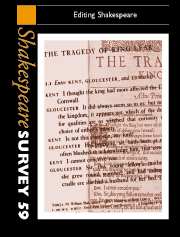Book contents
- Frontmatter
- Editing Shakespeare’s Plays in the Twentieth Century
- Crisis in Editing?
- On Being a General Editor
- Altering the Letter of Twelfth Night: ‘Some are born great’ and the Missing Signature
- ‘A Thousand Shylocks’: Orson Welles and The Merchant of Venice
- The Date and Authorship of Hand D’s Contribution to Sir Thomas More: Evidence from ‘Literature Online’
- Ferdinand’s Wife and Prospero’s Wise
- Editing Stefano’s Book
- Manuscript, Print and the Authentic Shakespeare: The Ireland Forgeries Again
- The Author, the Editor and the Translator: William Shakespeare, Alexander Chalmers and Sándor Petofi or the Nature of a Romantic Edition
- Women Edit Shakespeare
- The Shakespeare Edition in Industrial Capitalism
- Print and Electronic Editions Inspired by the New Variorum Hamlet Project
- The Evolution of Online Editing: Where Will it End?
- The Director as Shakespeare Editor
- The Editor as Translator
- Performance Editions, Editing and Editors
- Editing Collaborative Drama
- Will in the Universe: Shakespeare’s Sonnets, Plato’s Symposium, Alchemy and Renaissance Neoplatonism
- Giants and Enemies of God: The Relationship between Caliban and Prospero from the Perspective of Insular Literary Tradition
- Shakespeare’s Ages
- Who Wrote William Basse’s ‘Elegy on Shakespeare’?: Rediscovering a Poem Lost from the Donne Canon
- ‘Sometime a Paradox’: Shakespeare, Diderot and the Problem of Character
- Shakespeare Performances in England, 2005
- Professional Shakespeare Productions in the British Isles, January–December 2004
- The Year's Contributions to Shakespearian Study 1 Critical Studies
- 2 Shakespeare in Performance
- 3 Editions and Textual Studies
- Index
Giants and Enemies of God: The Relationship between Caliban and Prospero from the Perspective of Insular Literary Tradition
Published online by Cambridge University Press: 28 March 2007
- Frontmatter
- Editing Shakespeare’s Plays in the Twentieth Century
- Crisis in Editing?
- On Being a General Editor
- Altering the Letter of Twelfth Night: ‘Some are born great’ and the Missing Signature
- ‘A Thousand Shylocks’: Orson Welles and The Merchant of Venice
- The Date and Authorship of Hand D’s Contribution to Sir Thomas More: Evidence from ‘Literature Online’
- Ferdinand’s Wife and Prospero’s Wise
- Editing Stefano’s Book
- Manuscript, Print and the Authentic Shakespeare: The Ireland Forgeries Again
- The Author, the Editor and the Translator: William Shakespeare, Alexander Chalmers and Sándor Petofi or the Nature of a Romantic Edition
- Women Edit Shakespeare
- The Shakespeare Edition in Industrial Capitalism
- Print and Electronic Editions Inspired by the New Variorum Hamlet Project
- The Evolution of Online Editing: Where Will it End?
- The Director as Shakespeare Editor
- The Editor as Translator
- Performance Editions, Editing and Editors
- Editing Collaborative Drama
- Will in the Universe: Shakespeare’s Sonnets, Plato’s Symposium, Alchemy and Renaissance Neoplatonism
- Giants and Enemies of God: The Relationship between Caliban and Prospero from the Perspective of Insular Literary Tradition
- Shakespeare’s Ages
- Who Wrote William Basse’s ‘Elegy on Shakespeare’?: Rediscovering a Poem Lost from the Donne Canon
- ‘Sometime a Paradox’: Shakespeare, Diderot and the Problem of Character
- Shakespeare Performances in England, 2005
- Professional Shakespeare Productions in the British Isles, January–December 2004
- The Year's Contributions to Shakespearian Study 1 Critical Studies
- 2 Shakespeare in Performance
- 3 Editions and Textual Studies
- Index
Summary
This chapter engages with a growing body of criticism that analyses early modern drama from the perspective of insular literary tradition. Its eventual focus is on Shakespeare’s Tempest but it begins in Anglo-Saxon literature, before moving on to the foundation myth that appears in the medieval Brut, or Chronicles of England. These sources illuminate the play’s engagement with political and religious controversies that were current in England when the play was first performed in November 1611. This approach adds another dimension to the established post-colonial critique of the play and adds depth and complexity to the relationship between Prospero and Caliban as it exposes additional cultural significance in the manipulation of images deployed in the play. Although these images reflect traditional eschatological and mythical sources, those sources have hitherto been obscured by the overwhelming preoccupation of earlier critics with classical influences.
The best-known form of the mythical founding of Britain recounts the coming of Brutus, grandson of Aeneas of Troy, from Armorica, with a band of Trojans. They kill the giants they find when they land at Totnes in Devon and settle down to create a city-based society. European foundation myths citing Greek or Roman ancestors first appear in the work of the seventh-century Frankish chronicler, Fredegar. These myths offer explanations of how a society, civilization or realm came into being and include etiological material and eponymous characters. Many British myths, legends and stories include giants. From the work of Anglo-Saxon poets to that of sixteenth-century antiquarians, giants appear as the original inhabitants of the island of Britain. They are, of course, part of many foundation myths. The Titans of Greek legend are the classical version, and Genesis 6: 4 tells us that before the Flood ‘there were giants in the earth in those days’. Giants are the quintessential primary inhabitants in the myths of many realms and regions.
- Type
- Chapter
- Information
- Shakespeare Survey , pp. 239 - 253Publisher: Cambridge University PressPrint publication year: 2006

